Behold me, my beloved Jesus,
weighed down under the burden of my trials and sufferings,
I cast myself at Your feet,
that You may renew my strength and my courage,
while I rest here in Your Presence.
Permit me to lay down my cross in Your Sacred Heart,
for only Your infinite goodness can sustain me;
only Your love can help me bear my cross;
only Your powerful hand can lighten its weight.
O Divine King, Jesus,
whose heart is so compassionate to the afflicted,
I wish to live …
A reading from the Booh of Wisdom
Wis 9:13-18b
Who can know God’s counsel,
or who can conceive what the LORD intends?
For the deliberations of mortals are timid,
and unsure are our plans.
For the corruptible body burdens the soul
and the earthen shelter weighs down the mind that has many concerns.
And scarce do we guess the things on earth,
and what is within our grasp we find with difficulty;
but when things are in heaven, who can search them out?
Or who ever knew your counsel, except you had given wisdom
and sent your holy spirit from on high?
And thus were the paths of those on earth made straight.
A reading from the Letter of Paul to Philemon
9-10, 12-17
I, Paul, an old man,
and now also a prisoner for Christ Jesus,
urge you on behalf of my child Onesimus,
whose father I have become in my imprisonment;
I am sending him, that is, my own heart, back to you.
I should have liked to retain him for myself,
so that he might serve me on your behalf
in my imprisonment for the gospel,
but I did not want to do anything without your consent,
so that the good you do might not be forced but voluntary.
Perhaps this is why he was away from you for a while,
that you might have him back forever,
no longer as a slave
but more than a slave, a brother,
beloved especially to me, but even more so to you,
as a man and in the Lord.
So if you regard me as a partner, welcome him as you would me
From the Gospel according to Luke
14:25-33
Great crowds were traveling with Jesus,
and he turned and addressed them,
“If anyone comes to me without hating his father and mother,
wife and children, brothers and sisters,
and even his own life,
he cannot be my disciple.
Whoever does not carry his own cross and come after me
cannot be my disciple.
Which of you wishing to construct a tower
does not first sit down and calculate the cost
to see if there is enough for its completion?
Otherwise, after laying the foundation
and finding himself unable to finish the work
the onlookers should laugh at him and say,
‘This one began to build but did not have the resources to finish.’
Or what king marching into battle would not first sit down
and decide whether with ten thousand troops
he can successfully oppose another king
advancing upon him with twenty thousand troops?
But if not, while he is still far away,
he will send a delegation to ask for peace terms.
In the same way,
anyone of you who does not renounce all his possessions
cannot be my disciple.”
Jesus’ disciple renounces all his possessions because in Jesus he has found the greatest Good in which every other good receives its full value and meaning. (…) To explain this requirement, Jesus uses two parables: that of the tower to be built and that of the king going to war. (…) Jesus does not wish to address the topic of war here; it is only a parable. Yet at this moment in which we are praying intensely for peace, this word of the Lord touches us to the core, and essentially tells us: there is a more profound war that we must all fight! It is the firm and courageous decision to renounce evil and its enticements and to choose the good, ready to pay in person: this is following Christ, this is what taking up our cross means! This profound war against evil! What is the use of waging war, so many wars, if you aren’t capable of waging this profound war against evil? It is pointless! It doesn’t work…. Among other things this war against evil entails saying “no” to the fratricidal hatred and falsehood that are used. (…) These are the enemies to fight, united and consistent, following no other interests than those of peace and of the common good. (Pope Francis, Angelus, 8 September 2013)
Read More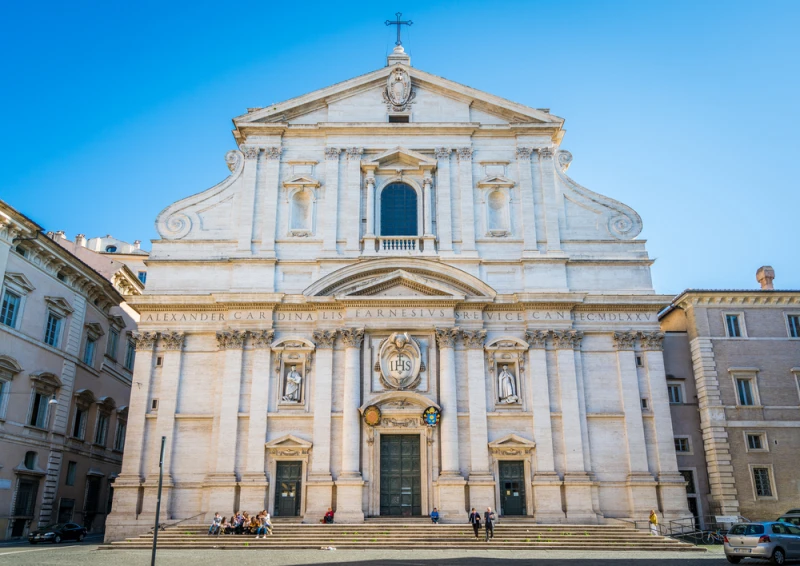

The Church of the Gesù, where a Mass and prayer vigil for LGBT Christians took place on Sept. 6, 2025, in Rome during the 2025 Jubilee Year of Hope. / Credit: essevu/Shutterstock
Vatican City, Sep 6, 2025 / 13:30 pm (CNA).
Bishop Francesco Savino, vice president of the Italian Bishops’ Conference, celebrated Mass at the Church of the Gesù on Saturday for LGBT pilgrims in Rome for the Jubilee of Hope.
An Italian lay association organized the international pilgrimage, which included a morning Mass celebration inside the mother church of the Society of Jesus in Rome and a St. Peter’s Basilica Holy Door pilgrimage in the afternoon.
More than 1,000 pilgrims from around the world attended the Mass concelebrated by approximately 30 priests, including American Father James Martin, SJ, who had met with Pope Leo XIV in a Sept. 1 private audience at the Vatican.
Several people, including religious brothers and sisters, waved rainbow-colored fans to keep cool inside the packed church and some wore shirts with a phrase from 1 John 4:18, “nell’amore non c’e timore” (“there is no fear in love”), during the Mass.
In his homily, Savino underscored the inherent dignity of every person and the need to “restore dignity to those who had been denied it.”
“We are all a pilgrim people of hope and we want to leave this celebration more joyful and hopeful than ever,” Savino said during his homily. “We have to go forward, convinced that God loves us [with] a unique and unrepeatable love … unconditional love.”
“In that awareness there is the foundation of all hope,” he said.
Reflecting on the selected Mass readings and Gospel for the day, Savino said St. Paul’s writings in the New Testament teach us that “a small step” in the midst of great human limitations may be “more pleasing to God than the outwardly correct life” of those who do not experience trials in life.
“We all have to convert, that is, we turn, we look in the opposite direction than before. The Acts of the Apostles documents this experience as defining and definitive,” he said.
“Truly I am realizing that each of us, you here present, your family members, your brothers and sisters, we pastors and disciples of the Lord — each of us has had in our lives to accept or to reject a living truth,” he added.
Asking the Lord to “deliver us freely from any polemical or ideological temptation, from any preconceived temptation based on prejudice,” the Italian bishop spoke of the need for “Peter and the Apostolic College to put living truth before dead truth,” a reference to the pope and bishops today.
The Sept. 6 Mass concluded with rounds of loud applause and great emotion. Family members and friends sang the recessional hymn and hugged each other as the bishop and concelebrating priests processed out of the main part of the basilica, led by a pilgrim holding a rainbow-colored cross.
According to the Catechism of the Catholic Church, people with “deep-seated homosexual tendencies … must be treated with respect, compassion, and sensitivity. Every sign of unjust discrimination in their regard should be avoided.”
The catechism also states that homosexual acts are “intrinsically disordered” and “under no circumstances can they be approved.”
Read More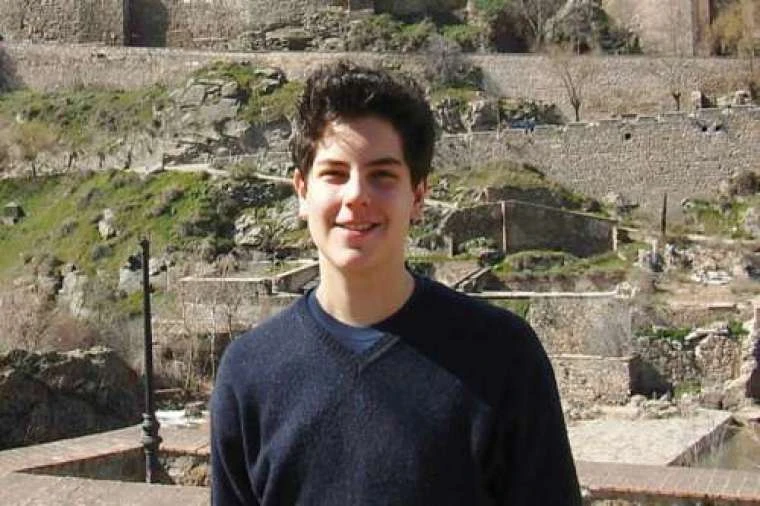

Carlo Acutis. / Credit: carloacutis.com
ACI Prensa Staff, Sep 6, 2025 / 13:00 pm (CNA).
Domenico Sorrentino, the bishop of Assisi, Italy, where the remains of Blessed Carlo Acutis rest, sent a message of encouragement to young people just prior to Pope Leo XIV’s declaring Acutis a saint of the Catholic Church along with another young Italian, Pier Giorgio Frassati.
“Dear faithful and most beloved young people, let yourselves be guided by Carlo, follow his example, follow in his footsteps, walk his path, because it is the right path, the one that leads to Jesus and, therefore, to love and joy,” the Italian prelate said in a message published Sept. 5.
The bishop of Assisi sent his message just two days before the canonization of Acutis, who will be declared a saint alongside Frassati on Sunday, Sept. 7, at a Mass celebrated by Pope Leo XIV in St. Peter’s Square at the Vatican at 10 a.m. local time.
Sorrentino also said that “today more than ever we need positive examples, exemplary life stories that will help our children not to be carried away by uncomfortable images, violent examples, and passing fads that leave nothing to be desired.”
“Carlo, on the other hand, teaches us to live a normal life, putting Jesus at the center. You, parents, also help your children discover Carlo’s holiness so that they can live a life full of joy, full of Jesus,” he emphasized.
Born on May 3, 1991, Acutis was a young Italian who from a very early age experienced a profound love for God, with a special devotion to Eucharistic miracles, which he compiled in a digital exhibition that he shared online.
Suffering from leukemia, Carlo died on Oct. 12, 2006, at the age of 15. He was beatified on Oct. 10, 2020.
The Diocese of Assisi also reported that some 800 pilgrims will arrive in Rome from Assisi on a special train arranged by the diocese. Twelve volunteers will be on board to distribute backpacks, scarves, and hats, and several priests and religious, led by the rector of the Shrine of the Spogliazione (Dispossession), Father Marco Gaballo, will be in charge of the group.
The Shrine of Spogliazione is the place where Carlo Acutis wanted to be buried, so Assisi welcomes both him and St. Francis.
Relics of the soon-to-be-canonized St. Carlo Acutis at the canonization
The Diocese of Assisi also announced that the relic of the heart of the young man who will become the first millennial saint will be brought to St. Peter’s Square in Rome. It was also announced that another relic of Carlo Acutis will be brought as a gift to Pope Leo XIV.
On Monday, Sept. 8, the day after the canonization, a Mass of thanksgiving will be celebrated in Assisi at St. Mary Major Church by Sorrentino. Carlo Acutis’ parents; Valeria, the young Costa Rican woman who received the miracle leading to Acutis’ canonization; and several civil authorities will be present.
The Diocese of Assisi also reported that, so far this year, some 630,000 pilgrims have come to the Shrine of the Spogliazione to venerate Acutis, with an average of up to 4,000 per day. In 2024, there were almost 1 million visitors.
This story was first published by ACI Prensa, CNA’s Spanish-language news partner. It has been translated and adapted by CNA.
Read More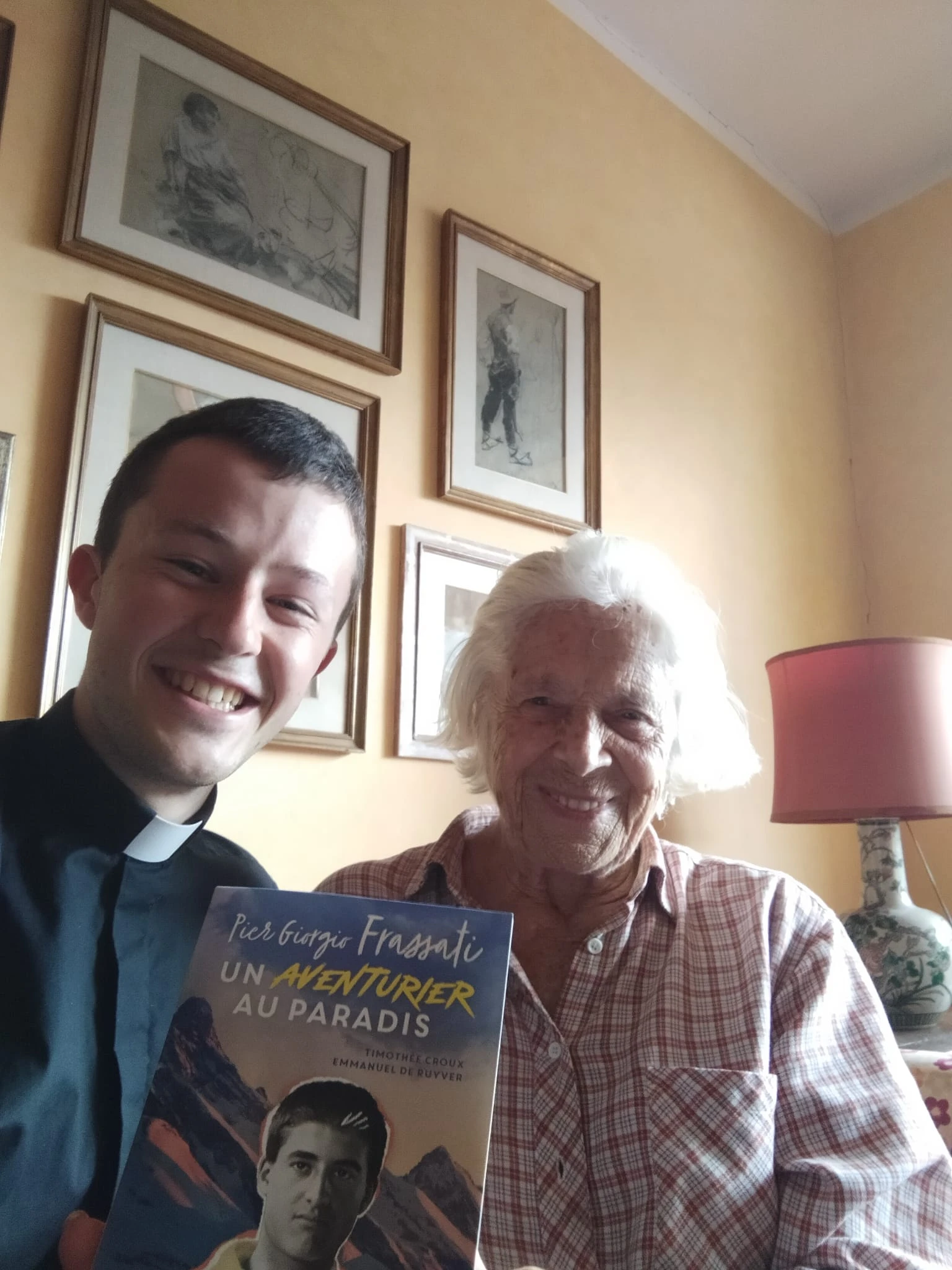

Timothée Croux, a young seminarian from the French Diocese of Meaux, has written a book about Pier Giorgio Frassati. / Credit: Victoria Cardiel/EWTN News
ACI Prensa Staff, Sep 6, 2025 / 12:00 pm (CNA).
Timothée Croux, a young seminarian from the French Diocese of Meaux in the Île-de-France region of the country, says the example of Blessed Pier Giorgio Frassati played a decisive role in his vocational discernment.
Croux said he discovered Frassati, who was from Turin, Italy, and who died in 1925, through scouting and shares many personal affinities with the soon-to-be saint.
“I delved deeper into Frassati’s personality during my preparatory year, before entering the seminary,” he said. “I discovered that there were many things in his biography that resembled mine. For example, we both have a passion for the mountains.”
“We both sought an authentic vocation, although in the end he decided not to become a priest in order to serve the poor in the mines, studying engineering to better help the miners,” Croux told ACI Prensa, CNA’s Spanish-language news partner.
An adventurer with a true appetite for life
Croux noted that this young man from Turin, set to be canonized Sept. 7 alongside Blessed Carlo Acutis, is highly regarded among French scouts “because he was an adventurer with a true appetite for life.”
Croux, 23, is preparing for the priesthood through his ecclesiastical studies at the Pontifical French Seminary in Rome. In collaboration with Belgian priest Emmanuel de Ruyver, he has published in France and Italy the book “An Adventurer in Paradise,” a spiritual biography of Pier Giorgio Frassati designed especially for young people and students.
“It has a biographical section with many stories about Frassati. At the end of each chapter, there is a meditation on a beatitude, reflection questions, a Gospel excerpt, and a short prayer,” Croux explained.
“By knowing him better, we can give young people the desire for holiness. Being a saint was a daily pursuit for him. Frassati was not a priest and did not die a martyr. But from his most tender years as a child, he strove to live the Gospel consistently and with a disconcerting freedom,” the seminarian emphasized.
Croux also maintains close contact with Frassati’s family, particularly with Wanda Gawronska, the blessed’s niece, who wrote the book’s preface and is scheduled to be present during Sunday’s canonization.

He died young like Acutis
The young man from Turin died at age 24, one week after contracting fulminant poliomyelitis while visiting the poor in their homes. His premature death is a characteristic he shares with Acutis, who died of leukemia at the age of 15.
“Young people may think that you have to die young to be a saint, but that’s not true. The important thing is to live faithfulness, charity, and hope throughout your life,” the French seminarian emphasized.
The poor and most vulnerable always held a special place in Frassati’s heart. When he was just a child, after a poor mother and her barefoot son knocked at his family’s door, he gave them his shoes, asking them to leave quickly before his family found out. Until shortly before his death, he worked to get money or medicine to those in need.
“He said he saw through them a light that we don’t have: the light of Christ. And he understood it deeply, as in Matthew 25: ‘If you visit the poor, the prisoners, the naked, it is I you visit.’ He had understood it. That’s why he calls us not to be afraid to go to the peripheries and visit the poorest,” Croux said.
The Frassati family was very wealthy. His father, Alfredo Frassati, was a senator, ambassador, and director of the Italian newspaper La Stampa. The future saint grew up in the Catholic upper-class environment of Turin. But “it was perfunctory Catholicism, and it wasn’t his parents who encouraged him to serve the poor. They only discovered the scope of his action after his death, when thousands of people wanted to pay tribute to him,” Croux explained.
Love for the poor, rooted in the Gospel
His passion for the poor was rooted above all in his love for the Eucharist, another characteristic he shares with Acutis. At the age of 13, he obtained permission from his mother to go to Mass every day.
“He used to say: ‘Jesus visits me every day in Communion, and I humbly return that visit by going to see the poor.’ He had understood that the Eucharist was the sacrament of charity,” Croux explained.
Frassati’s daily life, marked by faith, service, and evangelical consistency, made him — as St. John Paul II said, when he was still a cardinal in Krakow in 1977 — “the man of the eight beatitudes.”
“He saw in him a model of complete holiness, living every beatitude in his short life,” Croux noted.
Frassati received a strict education. He was not a great student, and his father was very severe with him, expecting him to take over as director of La Stampa. However, the young Frassati directed his life toward the study of engineering so he could be closer to the people working in terrible conditions underground in the mines.
Peace and social commitment
Another essential feature of Frassati’s life was his moral firmness in the face of the totalitarian threat.
Frassati was associated with the Italian Popular Party, inspired by a priest and based on principles of Christian democracy. But he left it when the movement made a pact with the Fascists in 1922. He also resigned from a Catholic student group, Cesare Balbo, after discovering that it had honored Mussolini during his visit to Turin.
“For Pier Giorgio, politics was a service, especially to the poorest, and he could not accept a movement that exalted force,” Croux explained.
His brief but intense life explains why today, 100 years later, Frassati continues to speak to thousands of young people. According to Croux, Frassati’s message to the youth of the 21st century can be summed up in three points: prayer and charity, friendship, and the pursuit of peace.
“He made a connection between the daily Eucharist and charity toward the poorest. Every morning he went to Mass and then visited needy families, offering food, clothing, and a smile,” the young seminarian noted.
This story was first published by ACI Prensa, CNA’s Spanish-language news partner. It has been translated and adapted by CNA.
Read More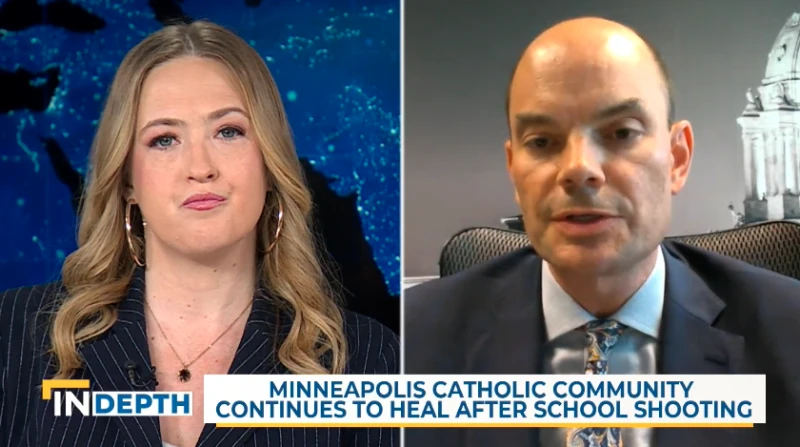

Jason Adkins, the executive director of the Minnesota Catholic Conference, speaks to “EWTN News In Depth” anchor Catherine Hadro on the shooting at Annunciation Catholic Church in Minneapolis, Friday, Sept. 5, 2025. “Almost everyone … in our Catholic community has a connection to Annunciation,” he said. / Credit: “EWTN News In Depth.”/Screenshot
CNA Staff, Sep 6, 2025 / 11:30 am (CNA).
A leading Catholic advocate in Minnesota is calling for an “all-of-the-above” approach to school safety and security in the wake of the Aug. 27 mass shooting at Annunciation Catholic Church in Minneapolis that claimed the lives of two children and injured more than 20 children and adults.
Jason Adkins, the executive director of the Minnesota Catholic Conference, told “EWTN News In Depth” anchor Catherine Hadro on Friday that “nonpublic school students” should have access to the same levels of security as those in public schools.
“We’ve been consistent advocates for [security] policies that include, and are nondiscriminatory against, nonpublic school students,” he said.
“We think that when the state makes a commitment to protecting students and to promote public safety, [that it’s] a basic public safety issue that should be available to all students, irrespective of where they go to school,” he argued further.
Adkins noted that Minnesota Catholic leaders in the past have implored state lawmakers to provide security funding for local nonpublic schools, though those calls went unheeded prior to the Aug. 27 shooting. “People have noticed that,” he said.
“Looking at school safety programs, nonprofit security grants, all these things — we have to take an all-of-the-above approach to looking at public policy solutions that limit gun violence in our communities,” he said.
Focusing just on guns will ‘fall short’
The Annunciation shooting once again touched off what is a regular debate in U.S. politics regarding school safety and gun crime. Some advocates have called for broad new gun control laws, while others have argued for arming teachers in classrooms.
In a statement this week amid a special session of the Minnesota Legislature, Adkins acknowledged that “continued discussion is warranted about access to certain weapons and high-capacity magazines.”
“At the same time, a special session that focuses only on gun regulations will fall short, as the issue runs deeper than firearm access,” he argued, calling for a focus on school security measures “that ensure the safety of all students.”
Adkins told Hadro, meanwhile, that policymakers and leaders “have to have honest conversations and take a look at every facet of this problem and explore creative solutions.”
In addressing the problem, meanwhile, he said those seeking solutions “have to see with the eyes of Christ.”
“Ultimately, there’s no political solution to what’s a theological and spiritual problem,” he said. “The answer to all these problems and challenges is ultimately the call to holiness.”
Read MoreThe fall of 1618 was a standout when it came to notable comets, boasting three visible to the naked eye. In late August, C/1618 Q1 appeared, first spotted in the skies over Hungary. Johannes Kepler observed the comet throughout the month of September, spotting it from Linz, Austria, through a small telescope on Sept. 6.Continue reading “Sept. 6, 1618: The first comet seen through a telescope”
The post Sept. 6, 1618: The first comet seen through a telescope appeared first on Astronomy Magazine.
Read More
DEABORN, MI — Just in time for fall, motorists found out that they were in for a special seasonal treat, as the Ford Motor Company introduced the limited edition Pumpkin Spice F-150 pickup truck.
Read More
DEARBORN HEIGHTS, MI — In what experts described as a major step toward a greater level of inclusivity for law enforcement agencies across the country, one Michigan police department announced that it would help Muslim immigrants feel more welcome by having its officers wear suicide vests while out on patrol.
Read More

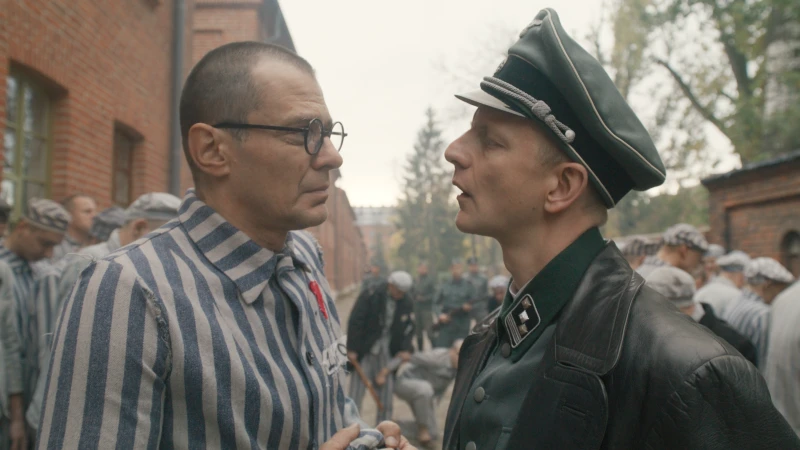

From left to right: Actor Marcin Kwaśny as Maximilian Kolbe and Christopher Sherwood as Karl Fritzsch in “Triumph of the Heart.” / Credit: Triumph of the Heart movie/Sherwood Fellows
CNA Staff, Sep 6, 2025 / 06:00 am (CNA).
Anthony D’Ambrosio grew up Catholic and always viewed his faith as one of the most important aspects of his life — even entering seminary for a brief period of time. However, he felt called to leave seminary and go into youth ministry. He fell in love and was about to get engaged when he was diagnosed with a life-altering medical condition — a chronic mold infection with a major symptom being severe and even life-threatening insomnia.
D’Ambrosio’s relationship ended, he couldn’t maintain a job, and his faith unraveled. It was during the sleepless nights that he began to discover the story of St. Maximilian Kolbe, which led to creating a movie about the saint — “Triumph of the Heart.” It will be released in theaters on Sept. 12.
St. Maximilian Kolbe was a Polish Franciscan friar, priest, and martyr who volunteered to die in place of another man in the German death camp of Auschwitz. Kolbe spent the last 14 days of his life in a starvation bunker alongside nine other men. “Triumph of the Heart” focuses on Kolbe’s last days on earth spent in the starvation bunker.
While writing the film, D’Ambrosio began to see his own battle with insomnia as “being a bit of a stand-in for starvation,” he told CNA in an interview. The fact that Kolbe was also able to accompany three other men “to that miracle of staying alive for 14 days without food or water with him” was also meaningful for D’Ambrosio because “I knew that if Kolbe could have helped men in that situation to find a reason to live, that he could help me to find a reason to live.”
As D’Ambrosio spent more and more time with Kolbe’s story, he began to “see what true sanctity looked like, what love looked like.”
“This idea that he had volunteered to take on the suffering of these men in order to be with them — that really began to melt my own heart and to open me back up to God’s presence,” he added.
It was then that D’Ambrosio began his journey to create the film. He began to write the script, pilgrimaged several times to Poland to learn more about Kolbe, lived with the Franciscan friars in Poland, studied his story with the librarian who handles his archives, and ultimately worked with an American crew and partnered with Poles to tell the martyr’s story.

Despite facing numerous challenges while making the film, D’Ambrosio said the most beautiful aspect was seeing “how generous the Catholic world has been.”
“Triumph of the Heart” was an entirely crowdfunded movie — meaning all production costs were covered thanks to donations from individuals.
D’Ambrosio shared that not only did everyday Catholics generously donate financially, but they also donated airline miles for the crew to be able to travel and many volunteered to go to Poland on their own dime to help with the production while the team was there for three months filming.
“I mean the whole movie is just a compilation of the stories of people who have sacrificed immensely in order to tell the story,” D’Ambrosio said.
When reflecting on the life and story of Kolbe, D’Ambrosio said it serves as a great reminder to Catholics that “when everything is hopeless, really, truly, love has the power to overcome darkness and to change the world.”
“The choice to have to maintain love and hope and faith in the face of darkness is the most powerful expression of God’s love and presence that any person can offer the world,” he added.
Despite having his life’s work destroyed by the Nazis and witness his country of Poland be conquered and destroyed by the Germans, Kolbe maintained his faith, and for D’Ambrosio “that has been the part of his life that has resounded the most throughout history and throughout time.”
“I think for anybody that is struggling in any way in their lives right now, they can look at his suffering and look at the fruit of it and make sense in many ways — maybe not make sense but they can like find a balm and find a compass for their own action the way that I did,” he said.
D’Ambrosio emphasized that the movie is primarily about hope and said he finds it “very apropos that this year was declared to be a Jubilee of Hope and that somehow Kolbe’s movie and his story is coming out in the jubilee year.”
The filmmaker said he hopes viewers “will come away with this catharsis — with this feeling of all of that was worth it if that’s what heaven is like.”
“I think that the way that the movie leaves people is like a little promise of ‘Hey, it’s going to be OK. The place we’re going is better and all of the suffering and trials and tribulations that you go through here now and all the crosses that you bear, they will be fully redeemed and you will be completely filled up and made new.’”
Read More
:max_bytes(150000):strip_icc():format(jpeg)/TAL-lead-beagle-kweene-advance-images-ALISTPOSTIAN0825-8f72ab480d4b4af399fd27b6a880746d.jpg)